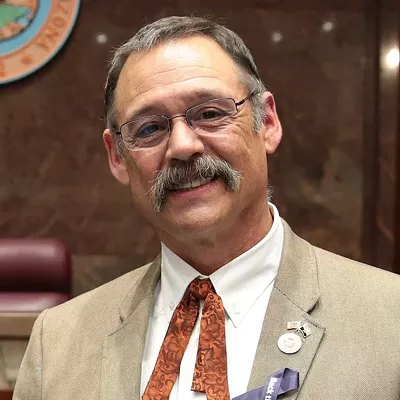Republican Patricia Noland has served as Pima County's Clerk of the Superior Court for more than 11 years, and in every election since her first, she's been able to count on one constant: the same challenger, Democrat Margaret DiFrank.
"I call her the Joe Sweeney of the Clerk of the Court (race)," Noland says, referring to the perennial crank candidate in Congressional District 7. "I do think of her as a disgruntled former employee. This is her one shot to go against me."
DiFrank worked for Noland after Noland's first election, and was fired after 10 months.
DiFrank says she expects Noland to characterize her as an angry ex-employee, but that she runs every election season because she feels her experience—she runs an investigations firm that often works on criminal legal cases, and holds a master's degree in public service management—makes her qualified.
"This is the only office I'm interested in. It's exactly what I'm all about. I was terminated (by Noland), but if anything, I'm a disgruntled taxpayer," DiFrank says.
While she worked under Noland, DiFrank says, she disagreed with what she considered to be unqualified hires. DiFrank says one current staff member helped Noland with campaigns when the clerk served as a state legislator, and another is a fellow Republican and former state legislator voted out of office in 2006. Those employees, according to DiFrank, are not qualified—and both make more than $90,000.
Noland's salary, which is set by the Board of Supervisors, is $76,600.
DiFrank thinks there's another reason for concern: On Noland's Facebook page, under Noland's picture, it reads: "This is an election year—yes Clerk of the Superior Court is an elected position!! I run every four years. Looking forward to retirement sometime in the next four years. I re-married three years ago. We travel to Mexico as often as possible."
DiFrank says she thinks Noland's plan is to win one more term and then retire in order to turn the office over to one of her employees—perhaps Toni Hellon, the former Republican state legislator on staff.
"Which is politics as usual, I know, but not the voters' choice," DiFrank says.
Regarding another issue, DiFrank refers to a letter that attorney Brick Storts sent to Noland on Aug. 9, 2007, regarding clerk staffing issues while he was representing Gerardo Zepeda, who was charged with first-degree murder and kidnapping. Storts complained that there were seven different clerks assigned to the trial, which led to mistakes that could have been avoided if only one clerk had been assigned.
"I have tried numerous cases within the court system, where a trial has lasted one or more weeks; you have only one assigned clerk involved in those trials," which provided continuity and prevented mistakes, Storts wrote to Noland.
DiFrank says many people don't understand that court recorders work for the judicial side of the court—recording every word of court happenings—while clerks from Noland's office work for the county and are responsible for taking minutes and keeping a record of what's happening in courtrooms.
"What (Storts) is talking about here is a lack of professional management," DiFrank says.
DiFrank also complains that too much money is going to administrative salaries; that the office suffers from high turnover due to low morale; and that Noland is not putting all criminal and civil court records online as required by Arizona law.
Currently, records are available at the Pima County Courthouse, where four computers are used for searches, and copies cost 50 cents per page.
"She's just not willing to make public access fully available," DiFrank says.
Regarding DiFrank's criticism about public records, Noland says that the Arizona Supreme Court has asked all counties to have all records go through the same portal for online access.
"They don't have it ready yet. (DiFrank would) be in the same place," Noland says. "... She wants it to seem as if I am against transparency, but that's just not my intention."
Instead, Noland says she has worked to make records more accessible by creating the system that allows the public to access records on the second floor of the courthouse.
Noland also says that's it's not true that she plans to retire—although she doesn't deny the wording on her Facebook page. "One of the reasons I want to run this term is to be there to help get us through this hard economic time. I'm familiar with the office (and) the budget, and I have a strong relationship with the county manager."
The concerns brought up in Storts' letter from three years ago are no longer an issue, Noland says. "We took the information from the letter very seriously, responded to it and fixed the problem. We were down (clerks) at that time; several had retired, and we hadn't been able to fill the positions. ... I'm not perfect, and I don't expect all my people to be perfect, but we work to correct our mistakes."
Noland adds that DiFrank's company, Info-Tracts, does work for Storts' office, and she wonders how DiFrank would separate herself from the business, which she owns with her husband, Terry Frederick. The business works closely with area attorneys and court cases throughout the state—and DiFrank would have access to records that could potentially benefit her business.
DiFrank says she recognizes the potential conflict, but has plans to "pass the baton" to a different business partner if she is elected.
Noland says that despite DiFrank's accusations, she feels her office is well-run.
"She can insinuate everything she wants. My people are paid less than those (on the judicial side) in Superior Court who are doing the same jobs. ... They are trustworthy, do the job and are loyal to the office," Noland says.











